The flag should have been the give-away. For the past eleven years, the Stars and Stripes had been flying over the house across the street from dawn till dusk. Sometimes I’d see my neighbor putting it to bed, carefully folding it into the triangular shape they taught us to use in the Cub Scouts.
I had noticed that the flag was missing. It was too prominent a part of my everyday vista for its absence to be overlooked. But I convinced myself that it must be because his hips — he’d had both of them replaced — were bothering him or because his invalid wife’s medical needs had disrupted his routine.
If I’d thought about it more carefully, I’d have realized that these troubles might have held him back for a day or two, but certainly not a month. The flag meant too much to him.
In the wake of September 11th, 2001, as Americans keen on showcasing their patriotism plastered their nation’s flag everywhere, it became common to see its silhouette against the night sky. This bothered me. Even though I hadn’t personally done anything with the flag since elementary school, I still remembered the rules for its display. And so did my neighbor. He went through the ritual of showing it the proper respect with painstaking care.
That’s how he did everything. His garage, in stark contrast to my own, was a model of cleanliness. The plants in his front yard, from the cactus to the cypress trees, were always perfectly neat. He drove his Jeep Cherokee all the time, but it always looked like he’d just polished it up for a special occasion. Even after his term on the Board of Directors for our Homeowner’s Association had ended, he continued to walk the perimeter of our sixty-five home subdivision, looking for leaks in the irrigation system and anything else that might need attending to.
Some members of the Board, retirees with too much time on their hands, would go out of their way to find fault with other people’s homes. They complained about landscaping choices. They complained about the color of backyard patio furniture. And they were indignant when one new homeowner wanted to fly a Mexican flag over his home.
My neighbor across the street was never like that. Despite being a proud member of the Promise Keepers, a conservative with no love for mainstream Republicans, much less Democrats, he was never petty. If he pointed something out, it was because he thought it mattered.
Maybe a tree was getting top-heavy and becoming a potential danger. Maybe someone was paying more for her water bill than she should, because there was a problem with her timer settings. Maybe a car was parked in such a way that emergency vehicles would have a hard time making it up the street. Those were the sorts of problems he brought to the Board’s attention.
In short, he was the archetype of the “good neighbor,” the sort of person you are happy to have in your community and even happier to have across the street. Long after he had finally figured out — it took him several years — that my worldview was very different from his, that I wasn’t a churchgoer, that I had never voted for a Republican and probably never would, he remained every bit as friendly towards me as when he had first introduced himself.
I did my best to respond in kind. After residing in the San Francisco Bay Area for over a decade, a place where moderate Democrats are considered deeply conservative, moving to Arizona was a massive culture shock. Although I’d grown up in a rural part of Pennsylvania where metropolitan pretense was laughed at, I’d never lived in a place where my values made me an extreme minority.
The realization that I didn’t pass muster confused me. Sometimes it made me angry. More often it just made me depressed. During the four years that I myself served on the Board of Directors — largely because my partner was afraid of what would happen if our perspective wasn’t represented — I learned to understand the impulse to self-segregate. The declarations I’d made during my years at UC Berkeley about the need for leftists to stop preaching to the converted now seemed presumptuously idealistic. Faced with the opportunity to do meaningful outreach, I mostly kept my mouth shut.
I vividly remember that day in 2004, during the pleasantries exchanged after the monthly meeting of our Board, when someone declared that she couldn’t believe that there were white men in the United States stupid enough to vote for Democrats. “They might as well be pointing a shotgun at their own skull,” she added, to the amusement of her fellow officers. But not me. For whatever reason, my reluctance to out myself as “other” finally crumbled to dust. “I vote for Democrats,” I piped up. “And the last time I checked, I was still a white man.”
The room went silent. The blood drained from my fellow Board members’ faces as they were forced to acknowledge that there was an enemy in their midst. Then, after a painfully long pause, one of them turned to me and spoke: “But you voted for the cheapest bid when we were selecting a new landscaping firm!” He simply couldn’t fathom that a liberal would want to spend less of the revenue brought in through homeowners’ dues.
My neighbor across the street was different. Even though he was probably the most conservative resident of our subdivision, he grasped intuitively that it was important to preserve the distinction between local and national politics. Whatever his ideological commitments, he refused to let them interfere with the practice of neighborliness.
That’s why, when my daughter first started to be interested in politics, during that 2004 Presidential campaign, I made heavy use of his example. She had spent years of pre-school learning that “there are no bad people, only bad decisions.” While her mother and I had little patience for the xenophobic politics of the Republicans in our suburban enclave, we didn’t want to undermine such a valuable lesson. I explained over and over that, even though we would never vote the way our neighbor across the street did, we could still get along with him if we were all willing to make the effort.
And we were. Before his wife’s health problems got the best of her, he would bring over the cookies she baked as a Christmas present. My partner and I would return the favor by telling him about the animals we’d spotted in our yard, showing him the photographs if we had managed to get a good shot. Even though he belonged to a church that took a dim view of the “pagan” holiday of Halloween, he always made sure to greet the neighborhood children when they came trick-or-treating. We talked with him about the weather. We talked with him about the little joys of parenting. We talked with him about anything and everything that didn’t fall under the rubric of politics.
I know quite a few leftists who would roll their eyes at this account of our attempts to sustain a semblance of community. Some of my friends, particularly those who live in liberal bastions on the coast, have asked me how we could be so polite to someone whose every trip to the ballot box was ultimately a vote against the very existence of people like us. When I told one of them that this neighbor was a member of the Promise Keepers, she replied, in a tone of incredulous disdain, “How could you stand it?” At the time, I struggled to answer. But now I know what I should have said, what I felt in my heart: “How could I stand not to?”
I’m even less enamored of the Republican Party in 2012 than I was in 2004. Although the Democrats continue to be a massive disappointment to me, I am too scared of the alternative to waste my vote on a protest against mainstream politics. Witnessed up close, the right-wing push to undermine the separation of church and state — one which my neighbor across the street vigorously advocated — seems a bigger threat to the American way of life than any external menace. And I’m pretty sure “Founding Fathers” like Benjamin Franklin and Thomas Jefferson would agree.
Yet despite taking a dim view of my neighbor’s ideological commitments, I am deeply grateful for having had him as my neighbor and especially for having taught me how to be a good neighbor. I may not feel as comfortable as I once did telling my fellow leftists to stop preaching to the converted, but this caution goes hand in hand with more modest advice. Outreach has to start with the search for common ground.
You already share one thing with your neighbors. The challenge is to use that fate, the accident of proximity, as the basis for finding others. As sympathetic as I am to the critique of humanism, my experiences living in Arizona have taught me that sometimes it’s still worth insisting that our humanity has the potential to transcend all political and economic divisions. At bottom, the concept of the good neighbor is a testament to this belief.
Last January 8th, my adopted home was shaken to the core by the assassination attempt on Congresswoman Gabrielle Giffords. Six people died and many more were seriously injured. Shot in the head at close range, Giffords somehow survived and is making slow but steady progress towards a recovery. After the shooting, international media descended on Tucson, telling a story of Arizona extremism: how the state’s lax gun laws and virulent conservatism helped create a climate in which a mentally ill man might feel encouraged to take violent action.
Having seen the same do-it-yourself signs accusing Giffords and President Obama of theft and treason that the shooter had and heard the conversations of conservatives in cafés and on local talk radio, I couldn’t wholly reject this analysis, even if it felt too easy. After all, my first response to news of the shootings, which took place in front of the local Safeway where I shop several times each week, was not surprise.
I’d been worried that right-wing rhetoric was getting out of hand and particularly concerned that it might lead to trouble in the “conflict zones” where suburban Republican demographics overlap with the mostly liberal ones of central Tucson. It almost seemed like the attack had been pre-ordained, even if the person who carried it out was too confused to be considered a political operative.
That didn’t stop me from getting angry. My first urge was to walk down the streets of my subdivision yelling at its conservative residents to come out and acknowledge what their ideology was capable of. I wanted someone to pay for having made it possible for rhetoric to turn into reality. Then I walked outside to our car and looked at the “Proud To Be an Arizona Democrat” bumper-sticker it had sported since 2004, pondering its Stars-and-Stripes design.
I turned to look across the street at my neighbor’s house. His flag was flying, of course, but at half mast. Yes, he was following standard protocol. But I was still moved by the gesture. Even if it pained him enormously to have Gabrielle Giffords as his representative, he wasn’t going to let that compromise his dignity. The flag he had fought for deserved better than the gloating heard on some radio stations, the statements of she-had-it-coming muttered by ideologues around the country.
Later that day, my neighbor was out in his front yard pruning. When he saw me, he walked across the street. We began our conversation gingerly, not sure what to expect from each other. Then I looked him in the eye. It was clear that he was as upset, in his own way, as I was. Once more, we had found a way to share.
The other day, his son-in-law saw me out front and came over to tell me the news. My neighbor had been diagnosed with leukemia in early December and had passed away shortly after Christmas. It seemed impossible. He had looked so healthy the last time we chatted. For the better part of a decade, he had been tending to his wife only to have her outlive him. I didn’t know what to say.
But now I’m figuring out what needs to be said. He was a man who knew when to put people before politics. He was a man who worked very hard to be the best neighbor he could be. He was a man worthy of as much respect as he showed the flag. He was a man who kept his promises.
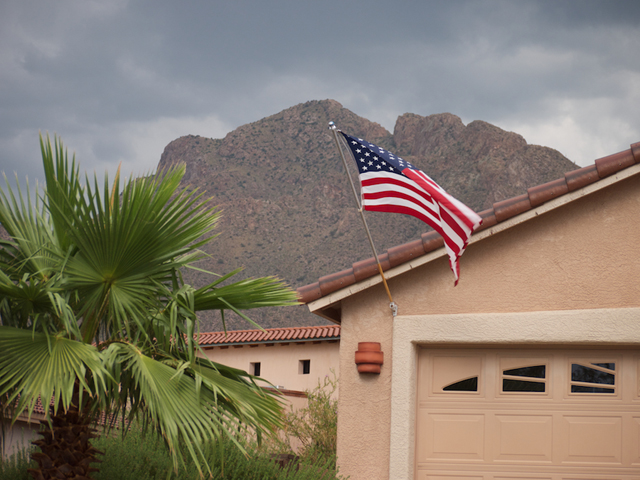



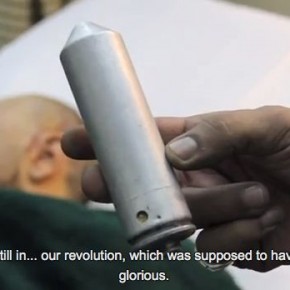

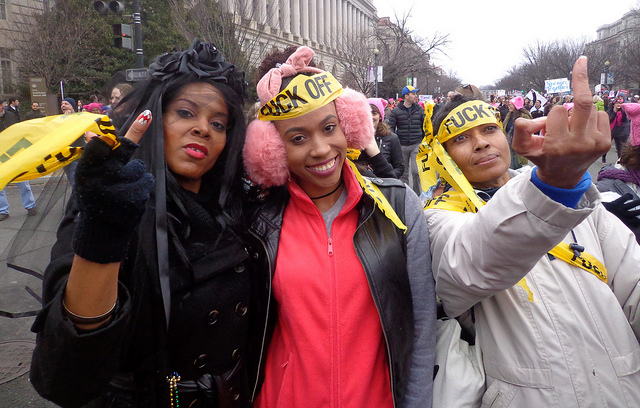
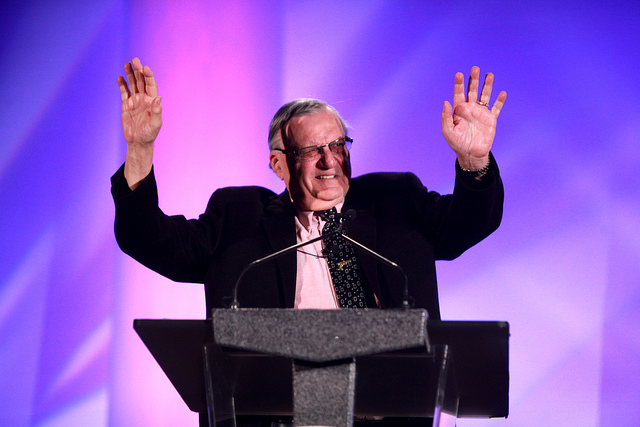
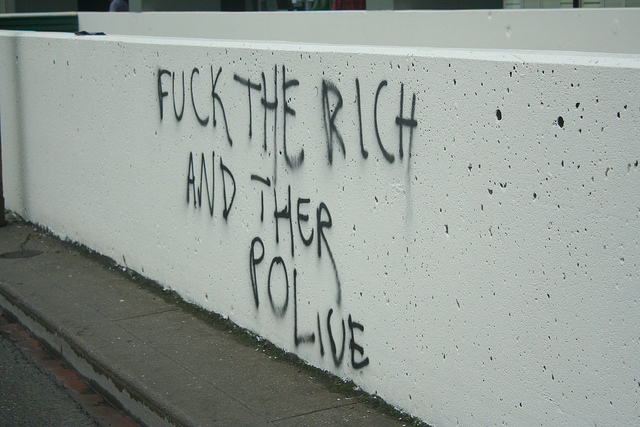
I have never read a more beautiful tribute to a neighbor which suggests how, during these troubled political times, we can share our common humanity. In fact, we must share our common humanity if anyone would believe our own rhetoric. After all, we are all bound together in the human family and our ability to love and respect one another despite differences will determine how well we’re doing! Thank you Charlie Bertsch (no relation). (I posted this response on my facebook as well!)
Interesting. I think this reminds me how hard it is for many of us, who consider ourselves to be open-minded, to be open-minded towards those who we consider to be close-minded. It’s something I need to work on.
A beautiful tribute to a neighbor and the inlaid hope often forgotten in our political tumult today. Thank you!
Therese: Thanks so much for writing! It’s a pleasure to share a last name with you, even if we aren’t related in any way.
Amanda G.: That’s the crux of the matter. I know it would have been a lot harder for me to remain open-minded about my neighbors had it not been for this man’s constant reminders that you can’t take the full measure of a man or woman by determining what their politics are.
R. Stoeser: Beautifully put. Thank YOU!